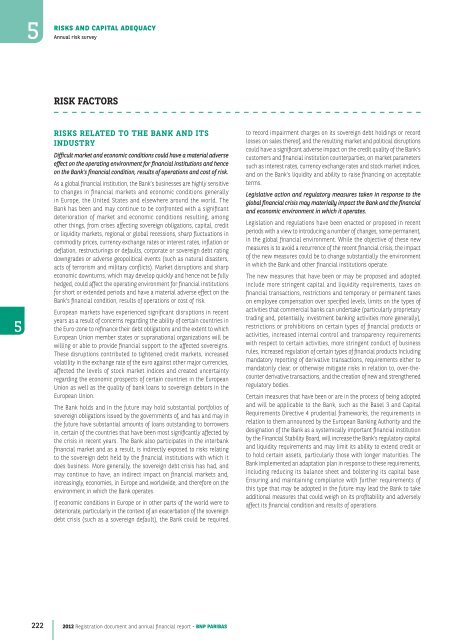2012 Registration document and annual financial report - BNP Paribas
2012 Registration document and annual financial report - BNP Paribas
2012 Registration document and annual financial report - BNP Paribas
- No tags were found...
Create successful ePaper yourself
Turn your PDF publications into a flip-book with our unique Google optimized e-Paper software.
5RISKSAND CAPITAL ADEQUACYAnnual risk surveyRISK FACTORS5RISKS RELATED TO THE BANK AND ITSINDUSTRYDifficult market <strong>and</strong> economic conditions could have a material adverseeffect on the operating environment for <strong>financial</strong> institutions <strong>and</strong> henceon the Bank’s <strong>financial</strong> condition, results of operations <strong>and</strong> cost of risk.As a global <strong>financial</strong> institution, the Bank’s businesses are highly sensitiveto changes in fi nancial markets <strong>and</strong> economic conditions generallyin Europe, the United States <strong>and</strong> elsewhere around the world. TheBank has been <strong>and</strong> may continue to be confronted with a significantdeterioration of market <strong>and</strong> economic conditions resulting, amongother things, from crises affecting sovereign obligations, capital, creditor liquidity markets, regional or global recessions, sharp fluctuations incommodity prices, currency exchange rates or interest rates, inflation ordeflation, restructurings or defaults, corporate or sovereign debt ratingdowngrades or adverse geopolitical events (such as natural disasters,acts of terrorism <strong>and</strong> military conflicts). Market disruptions <strong>and</strong> sharpeconomic downturns, which may develop quickly <strong>and</strong> hence not be fullyhedged, could affect the operating environment for <strong>financial</strong> institutionsfor short or extended periods <strong>and</strong> have a material adverse effect on theBank’s <strong>financial</strong> condition, results of operations or cost of risk.European markets have experienced significant disruptions in recentyears as a result of concerns regarding the ability of certain countries inthe Euro-zone to refinance their debt obligations <strong>and</strong> the extent to whichEuropean Union member states or supranational organizations will bewilling or able to provide <strong>financial</strong> support to the affected sovereigns.These disruptions contributed to tightened credit markets, increasedvolatility in the exchange rate of the euro against other major currencies,affected the levels of stock market indices <strong>and</strong> created uncertaintyregarding the economic prospects of certain countries in the EuropeanUnion as well as the quality of bank loans to sovereign debtors in theEuropean Union.The Bank holds <strong>and</strong> in the future may hold substantial portfolios ofsovereign obligations issued by the governments of, <strong>and</strong> has <strong>and</strong> may inthe future have substantial amounts of loans outst<strong>and</strong>ing to borrowersin, certain of the countries that have been most significantly affected bythe crisis in recent years. The Bank also participates in the interbank<strong>financial</strong> market <strong>and</strong> as a result, is indirectly exposed to risks relatingto the sovereign debt held by the <strong>financial</strong> institutions with which itdoes business. More generally, the sovereign debt crisis has had, <strong>and</strong>may continue to have, an indirect impact on <strong>financial</strong> markets <strong>and</strong>,increasingly, economies, in Europe <strong>and</strong> worldwide, <strong>and</strong> therefore on theenvironment in which the Bank operates.If economic conditions in Europe or in other parts of the world were todeteriorate, particularly in the context of an exacerbation of the sovereigndebt crisis (such as a sovereign default), the Bank could be requiredto record impairment charges on its sovereign debt holdings or recordlosses on sales thereof, <strong>and</strong> the resulting market <strong>and</strong> political disruptionscould have a significant adverse impact on the credit quality of the Bank’scustomers <strong>and</strong> <strong>financial</strong> institution counterparties, on market parameterssuch as interest rates, currency exchange rates <strong>and</strong> stock market indices,<strong>and</strong> on the Bank’s liquidity <strong>and</strong> ability to raise financing on acceptableterms.Legislative action <strong>and</strong> regulatory measures taken in response to theglobal <strong>financial</strong> crisis may materially impact the Bank <strong>and</strong> the <strong>financial</strong><strong>and</strong> economic environment in which it operates.Legislation <strong>and</strong> regulations have been enacted or proposed in recentperiods with a view to introducing a number of changes, some permanent,in the global <strong>financial</strong> environment. While the objective of these newmeasures is to avoid a recurrence of the recent <strong>financial</strong> crisis, the impactof the new measures could be to change substantially the environmentin which the Bank <strong>and</strong> other <strong>financial</strong> institutions operate.The new measures that have been or may be proposed <strong>and</strong> adoptedinclude more stringent capital <strong>and</strong> liquidity requirements, taxes on<strong>financial</strong> transactions, restrictions <strong>and</strong> temporary or permanent taxeson employee compensation over specified levels, limits on the types ofactivities that commercial banks can undertake (particularly proprietarytrading <strong>and</strong>, potentially, investment banking activities more generally),restrictions or prohibitions on certain types of <strong>financial</strong> products oractivities, increased internal control <strong>and</strong> transparency requirementswith respect to certain activities, more stringent conduct of businessrules, increased regulation of certain types of <strong>financial</strong> products includingm<strong>and</strong>atory <strong>report</strong>ing of derivative transactions, requirements either tom<strong>and</strong>atorily clear, or otherwise mitigate risks in relation to, over-thecounterderivative transactions, <strong>and</strong> the creation of new <strong>and</strong> strengthenedregulatory bodies.Certain measures that have been or are in the process of being adopted<strong>and</strong> will be applicable to the Bank, such as the Basel 3 <strong>and</strong> CapitalRequirements Directive 4 prudential frameworks, the requirements inrelation to them announced by the European Banking Authority <strong>and</strong> thedesignation of the Bank as a systemically important <strong>financial</strong> institutionby the Financial Stability Board, will increase the Bank’s regulatory capital<strong>and</strong> liquidity requirements <strong>and</strong> may limit its ability to extend credit orto hold certain assets, particularly those with longer maturities. TheBank implemented an adaptation plan in response to these requirements,including reducing its balance sheet <strong>and</strong> bolstering its capital base.Ensuring <strong>and</strong> maintaining compliance with further requirements ofthis type that may be adopted in the future may lead the Bank to takeadditional measures that could weigh on its profitability <strong>and</strong> adverselyaffect its <strong>financial</strong> condition <strong>and</strong> results of operations.222<strong>2012</strong> <strong>Registration</strong> <strong>document</strong> <strong>and</strong> <strong>annual</strong> <strong>financial</strong> <strong>report</strong> - <strong>BNP</strong> PARIBAS





